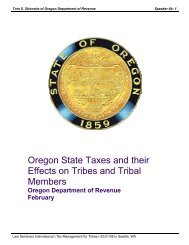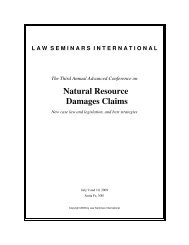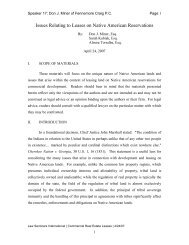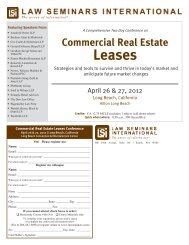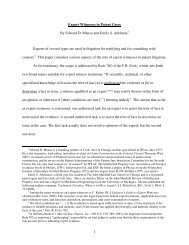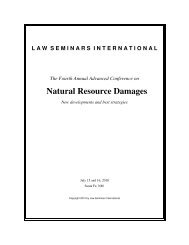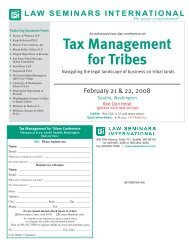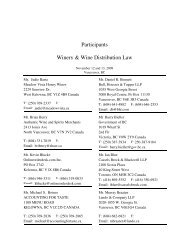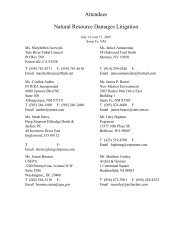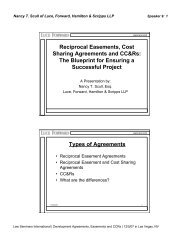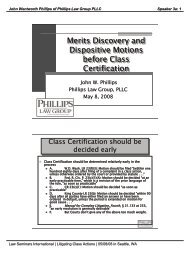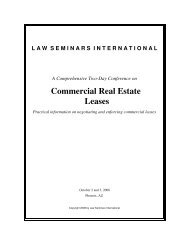LSI 2010 Real Estate Joint Ventures conference materials.pdf
LSI 2010 Real Estate Joint Ventures conference materials.pdf
LSI 2010 Real Estate Joint Ventures conference materials.pdf
Create successful ePaper yourself
Turn your PDF publications into a flip-book with our unique Google optimized e-Paper software.
John W. Hanley, Jr. of Davis Wright Tremaine LLP Speaker 20a: 9<br />
(d) Construction and Development Management Fees. Sometimes a proposed fund<br />
will target development opportunities, and the fund sponsor may propose that an affiliate provide<br />
construction management or real estate development services, usually pursuant to a separate<br />
agreement, in exchange for the fee stated therein (perhaps a percentage of the construction or<br />
development phase budget).<br />
(e) Sponsor Overhead Fees. Occasionally a private equity fund will allow the<br />
sponsor to recoup a small portion of its general administration and overhead by means of an<br />
additional services fee, such as an annual accounting/reporting fee.<br />
(f) Placement Fees. Finally, a fund sponsor may be able to persuade a prospective<br />
investor that the placement fee typically paid by the investor to its own family wealth office,<br />
advisor or other representative should be split, with a portion of that fee going to the fund<br />
sponsor, in consideration of the fund manager’s willingness to present this fund investment<br />
opportunity.<br />
3. Structure and Governance of Fund.<br />
Basic Structure and Documentation. A fund is a separate legal entity, typically formed as<br />
a limited liability company or a limited partnership. Delaware is frequently chosen as the<br />
jurisdiction of formation, although, in an earlier era, Maryland was a favored jurisdiction for the<br />
formation of limited partnerships.<br />
The sponsor of the fund may choose to serve as the manager (in the case of an LLC) or<br />
general partner (in the case of an LP) of the fund entity, or the sponsor may have an existing<br />
affiliated management company ready to serve that function, or the sponsor may form a new<br />
special purpose entity to play that role only for a particular fund. Investors will participate in the<br />
fund either as members (of the LLC) or limited partners (of the LP). Regardless of the form of<br />
entity, the entity formation laws of the organization’s jurisdiction will typically permit the<br />
entity’s founder to create multiple classes of ownership interests, so the capital structure of a<br />
fund may be as complex as the aspirations and imagination of the founder allows.<br />
In the balance of this paper, to simplify the discussion, we will assume that the typical<br />
real estate fund is a limited liability company, and all investors in it are members of a single<br />
class. The fund will be governed by a limited liability company agreement (sometimes called an<br />
“operating agreement”), a contract to which the fund manager and all members are parties. The<br />
fund will also be governed by the formation law of the state of organization, which may impose<br />
absolute requirements concerning governance or operation of the fund, or “default rules” that<br />
will be applicable in the absence of contrary rules specifically stated in the limited liability<br />
company agreement. One reason Delaware is a favorite jurisdiction, among lawyers, for<br />
formation of real estate funds (and joint ventures) is that state’s expressed policy (stated in its<br />
statute) to maximize freedom of contract. The Delaware Limited Liability Company Act<br />
imposes very few absolute rules of operation on the limited liability company formed in that<br />
jurisdiction; it creates most no default rules that will govern if the framers of the fund’s operating<br />
agreement forget to set a different rule in the document; and it expressly authorizes the founders<br />
of the limited liability company to use the operating agreement to modify – or eliminate –certain<br />
common law rules of conduct that Delaware courts would otherwise impose on the fund or its<br />
DWT 13620946v1 0000099-071219<br />
Law Seminars International | <strong>Real</strong> <strong>Estate</strong> <strong>Joint</strong> <strong>Ventures</strong> and Funds | 02/09/10 in Seattle, WA<br />
8




